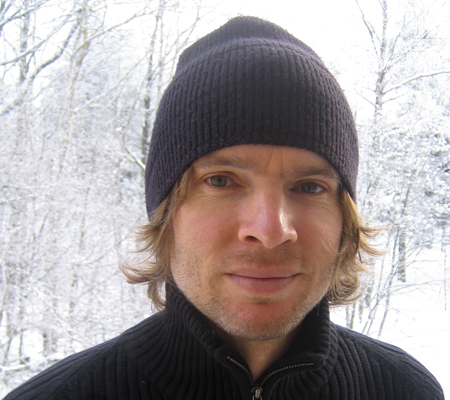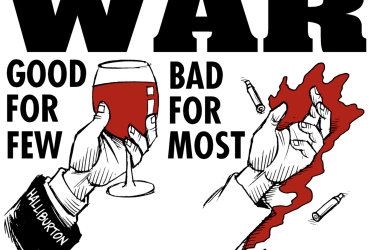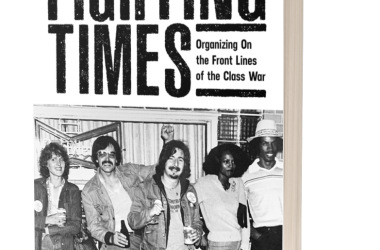By Gabriel Kuhn
A review of Deric Shannon, Anthony J. Nocella II, and John Asimakopoulos, eds., The Accumulation of Freedom: Writings on Anarchist Economics (Oakland/Edinburgh: AK Press, 2011). Originally published by Alpine Anarchist Productions.
I
Anarchist discussions revolve around abolishing the state, capitalism, and all forms of oppression, at the same time envisioning a better future for all of us in a just and free society. Interestingly enough, some very basic questions are rarely asked. For example: How do we get our bread? How do we get our cotton shirts? How do we get the smart phones we have become so accustomed to? Obviously, these questions, and a million of others like them, all relate to a very general one: How will anarchists run the economy?
Stimulating anarchist debate on economic issues seems to have been a main motivating factor behind the publication of The Accumulation of Freedom: Writings on Anarchist Economics. At the same time, the book attempts to refute the argument—particularly popular among Marxists —that such debates are entirely absent from the anarchist tradition. In their introduction, the editors, Deric Shannon, Anthony J. Nocella II, and John Asimakopoulos, state: “[A]narchists have contributed to economic thought, despite historical portrayals that write them out— reducing the narrative to capitalism and its Marxian opponents—and we do aim to remedy this despite some of these tensions. Indeed, as the libertarian wing of the socialist movements, anarchism played a key role in the development of economic analyses, practices, and visions of a future society that were anti-capitalist and non-Marxist” (13-14).
To strengthen their point, the editors have assembled a cast of twenty authors tackling the topic of anarchist economics from different angles. Their contributions are divided into six parts.
In part 1, History, Chris Spannos offers a very useful overview of the anarchist history of economic debate, with Iain McKay adding specifics on Pierre-Joseph Proudhon, often seen as the godfather of anarchist economics or, as McKay puts it, “the founder of anarchism as a named socio-economic theory” (64).
Part 2, Analysis, opens with a great summary of the characteristics, strengths, and weaknesses of contemporary capitalism by Abbey Volcano and Deric Shannon. The piece is followed by two articles addressing possibilities of anti-capitalist resistance: Jeff Monaghan and D.T. Cochrane investigate the potential of “political-economic disruption campaigns”, while Richard J. White and Colin C. Williams explore everyday economic interactions that remain outside of capital’s control.
In part 3, Critique, John Asimakopoulos, Robin Hahnel, and, in tandem, William T. Armaline and William D. Armaline prove in their respective contributions that Marxists have no monopoly on thorough anti-capitalist analysis.
In part 4, Practice, Uri Gordon provides an excellent summary of current anarchist economic practices and their relation to anarchist goals and strategies, with Caroline Kaltefleiter illustrating some of these practices further, focusing in particular on the Ithaca HOURS, an alternative currency used in Ithaca, New York, and the Dryden Café, a cooperative coffee shop in the town of Dryden, nearby.
Part 5, Resistance, has a decidedly international orientation and portrays various examples of anti-capitalist resistance from outside of the US: Marie Trigona tells about the experiences of factory occupations in Argentina in the 2000s, while Ernesto Aguilar describes various forms of anti-capitalist resistance lived and expressed by people of color around the world.
In part 6, Visions, three authors discuss possible guidelines for an anarchist economy: Deric Shannon engages in a critical analysis of mutualism, Scott Nappalos argues for libertarian communism, and Wayne Price explains what he understands as “the anarchist method”, which he ties to “the doubt that every region and national culture will choose the same version of libertarian social society”; referencing Peter Kropotkin, Price calls for “a flexible society based on voluntary associations” (316).
The book is rounded out with a thoughtful preface by Ruth Kinna, professor of political theory at Loughborough University and editor of Anarchist Studies, and an afterword by today’s best-known anarchist—or anarchist-leaning—economic theorist and most prominent advocate of “Participatory Economics” (Parecon), Michael Albert. The editors also added a last-minute postscript on the Occupy protests, written in November 2011.
II
The 350 pages of The Accumulation of Freedom are filled with interesting and inspiring thoughts. Therefore, it is perhaps unfair to focus on perspectives that I would like to see added in future editions. Yet, it is an attempt to contribute to the debate, and I hope it will be perceived as such.
Feminism
As a number of authors in The Accumulation of Freedom mention, there exists a large sector of non-remunerated labor forming the foundation of the wage labor system. This challenges the traditional Marxist focus on wage labor both as the central point of capitalism’s contradictions and as the main site of anti-capitalist resistance. The non-monetized labor sector, however, cannot be sufficiently analyzed without recognizing women as its main historical agent. Therefore, I believe that feminist anti-capitalist, yet non-Marxist (or “post-Marxist”), economic theory is a crucial field of study for anarchists. One example is the so-called Bielefeld School of the 1970s, whose main exponents, Maria Mies, Veronika Bennholdt-Thomsen, and Claudia von Werlhof, pioneers of both eco-feminism and subsistence theory, co-authored the book Women: The Last Colony (1988).
Technology/ecology
I believe that any anarchist economic theory must answer to the question of how complex structures of economic production can be maintained in an anarchist, i.e., horizontal and non-authoritarian society. If primitivism has anything going for it, then it is, in my opinion, the claim that it is impossible to uphold current levels of economic production without elements of hierarchy and coercion. To simplify for the sake of emphasizing the point: Who will ever voluntarily shorten his or her lifespan by extracting minerals from toxic mines in order to guarantee the affordable production of our valued electronic goods? How can the current level of economic production be maintained without major ecological destruction? How can globally demanded products such as sugar and coffee be adequately distributed without either a profit-driven market or a centralized bureaucratic apparatus?
Any debate on anarchist economics seems to require a debate on fundamental values: What is it that we actually need and want? This, in turn, leads to a debate about economic vision: What levels of production are possible and feasible? Are cities sustainable? What does “economic progress” mean? Our economic strategies require at least a vague idea of our goals.
Precarity
In their essay “Escaping Capitalist Hegemony,” Richard J. White and Colin C. Williams share important ideas regarding the possibility to tease out, experiment with, and expand alternatives to capitalism in the here and now. However, presenting “alternative/post-capitalist economic practices” (118) under headers like “Non-monetized Exchange” or “Not-for-Profit Monetary Transactions” (128-129) seems to overlook how deeply many of these practices are today incorporated into the capitalist system. Many people currently working for free do this because it is a part of their training, because it is the only way of gaining work experience, or because it might boost their CV. “Unpaid community work” and “more formal voluntary work” as well as “charity shops” and “garage sales” (129) largely function as integral parts of neoliberal capitalism. The exploitation of “alternative/post-capitalist economic practices” is one of neoliberalism’s key characteristics, be it in the form of free labor or by using “independent” and “non-commercial” initiatives as an excuse to direct investment away from the commons and towards private enterprise in ever increasing blatancy. Most people in precarious situations —and this includes entire Third World societies that trump every First World punk collective in DIY skills out of sheer necessity – do not find anything glamorous or revolutionary about being marginalized within the capitalist system. While I agree that notions of an all-penetrating capitalist culture have defeatist and fatalistic dimensions, capitalism is reproduced in the same social fabric that contains promises of alternative economies—untangling the threads is possible, but it is bloody hard work and needs plenty of self-inspection.
Wertkritik
In particular in the German-speaking world, Wertkritik, literally “Value Critique,” has emerged as an internal Marxist challenge to an understanding of anti-capitalism based on a critique of exploitation, surplus value, and class society. Wertkritik theorists focus instead on the first chapter of Das Kapital, “Commodities,” i.e., on value-form and commodity fetishism. According to Wertkritik theorists, these features define the foundations of capitalism, while class antagonism etc. are mere symptoms. One might say that for Wertkritik theorists, the psychological consequences of capitalism—egotism, rivalry, alienation—are central to its strength and affect everyone. From such a perspective, a “capitalist world” is much more than a world in which “goods and services are produced, distributed, and organized around the unadulterated pursuit of profit in the marketplace” (White and Williams, 117), and we do not become anti-capitalists simply by rejecting the wage labor system or by waging class war. If we do not think and act based on solidarity rather than competition, if we do not establish non-mediated social relationships, if we do not undercut the monetary logic, and if we do not challenge the separation of labor from other aspects of life, we remain caught in the capitalist web. As a result, many supposedly non-capitalist communities or projects—underground networks, workers’ controlled cooperatives, non-profit organizations—reproduce the foundations of capitalism, because they are still driven by the same desires (recognition, vanity, success, and so forth).
In other words, Wertkritik theorists focus on capitalism as a system, not as a tool of oppression controlled by a conspiratorial class of rulers. The rulers of industry and commerce are exchangeable. You can defame, bankrupt, and shoot as many capitalists as you want, and you can target and shut down as many corporations as you like, as long as there is capitalism, there will always be new ones. Jeff Monaghan and D.T. Cochrane are right that “political-economic disruption campaigns” can raise awareness in the form of effective anti-capitalist propaganda. However, when they claim that “we can use this model as a method to evaluate campaigns that challenge capitalists, large and small” (102), Wertkritik theorists would point out that we really need to challenge capitalism, not certain individuals. I think that disclosing the shortcomings of the so-called “personalized critique of capitalism” is one of Wertkritik’s strongest assets.
A critical reading of Wertkritik goes a long way if anarchists don’t want to end up as the “worse Marxists” by basing their critique of capitalism on traditional, and indeed often simplified, interpretations of Marx’s work. Major Wertkritik projects are the German Krisis and EXIT!, with several texts available in English online. The probably best-known English-speaking theorist with Wertkritik credentials is Moishe Postone, professor of History at the University of Chicago and author of Time, Labor and Social Domination: A Reinterpretation of Marx’s Critical Theory (1993).
Libidinal Economy
Another radical critique of capitalism that differs from traditional Marxist approaches was formulated in the 1970s by some of the so-called poststructuralist authors. Gilles Deleuze and Félix Guattari’s famous books Anti-Oedipus (1972) and A Thousand Plateaus (1980) carried the subtitle Capitalism and Schizophrenia (vol. 1 and 2, respectively). Combining political with psychoanalytical analysis, Deleuze and Guattari identified both revolutionary and reactionary strains in capitalism’s historical development. These strains are not primarily defined by individual qualities or by class identity, but by forces of creativity and liberation on the one hand and of control and conformity on the other. In the eyes of Deleuze and Guattari, the anti-capitalist task was to strengthen the former and weaken the latter, thereby pushing capitalism to its limits. A similar concept was presented by Jean-François Lyotard in Libidinal Economy (1974).
Similar to Wertkritik theorists, the French authors challenge the assumption of the working class as per se revolutionary. They contend that, historically, workers have often rallied around reactionary causes. How is it possible, Deleuze and Guattari ask, that people often desire their own oppression, especially in capitalism? One reason they identify is that capitalism and consumer culture satisfy certain desires that remain unfulfilled in most socialist alternatives on offer. Therefore, analyzing workers’ desires becomes a necessary requirement for the working class’s revolutionary promise to manifest—this is the infamous “schizoanalysis” in a nutshell.
I do not want to advocate “libidinal economy” as a superior form of anti-capitalist analysis. In fact, I find many aspects of the above-sketched theories very problematic. However, taking the libidinal dimensions of capitalism seriously might indeed be necessary to examine the system in all its complexity.
Anti-Capitalism
Both Wertkritik and libidinal economy suggest that not every anti-capitalist critique is revolutionary. Anti-capitalist critique can also be based on reactionary romanticizations of the past or on totalitarian ideologies afraid of capitalism’s creative impulses. Radicals, anarchists included, ought to take these warnings seriously. The left has no monopoly on anti-capitalism. Right-wing anti-capitalism— whether it is based on feudalist, religious, or völkisch (ethno-cultural) atavism—needs to be recognized and fought. This requires radical anti-capitalist theory to clearly distinguish between progressive and regressive tendencies. Especially in the context of idealizing supposedly unadulterated pre-capitalist or non-capitalist societies, the boundaries between these tendencies often become rather blurry. The fact that anti-capitalism alone does not translate into anarchist, or even broadly socialist, societies is confirmed by Ernesto Aguilar’s and Scott Nappalos’s respective contributions to The Accumulation of Freedom. While both authors list several examples of inspiring anti-capitalist resistance, only a limited number have led to overall social liberation.
Trying to dismiss right-wing anti-capitalism as nothing but false or hypocritical anti-capitalism means to cop out and hide one’s own lack of better arguments. This, in turn, keeps us from sharpening our anti-capitalist positions. As much as we need an anarchist critique of capitalism, we also need an anarchist critique of (certain forms of) anti-capitalism.
Class
One of the most laudable aspects of The Accumulation of Freedom is the strong focus on class. While some anarchists simply disregard class or leave relevant reflections to Marxist critics, the editors and authors of The Accumulation of Freedom reclaim the revolutionary legacy of anarchist class politics. This is of great importance, as class remains a central factor in all forms of privilege, discrimination, and oppression, which also means that class politics must be at the heart of every struggle for social justice. However, once we try to define class, things become more complicated.
In the introduction to The Accumulation of Freedom, the editors state that “a traditional two-class analysis”—“working class” vs. “ruling class”—is what most anarchists argue for (19-20). This might be true. But is it the right approach? Of course we can include everyone in the working class who does not “control investment decisions, determine high level policy, set the agenda for capital and state” (20), but the working class we’ll end up with will be so broad and heterogeneous that it might lose all analytical significance. There are huge differences between workers (in such a broad sense), expressed by various levels of economic, social, and cultural privilege, all related to class background. If these differences aren’t addressed, I don’t think we can build a truly united movement.
I strongly believe that our analysis of class needs to account for aspects that go beyond mere economic and/or political power. For example, I do not control investment decisions, I do not determine high level policy, and I do not set the agenda for capital and state. Furthermore, I live in a small apartment, I do not own a car, and I consider getting a can of organic soda from the health food store a major treat. Yet, does my situation compare to that of my best high-school buddy’s dad who, after fifty years of working in a print shop, lives on a meager pension? Does it compare to that of a migrant woman cleaning office buildings all day for a shitty salary? Does it compare to that of a land laborer’s daughter doing late night shifts in a bar in order to afford an education during the daytime? It doesn’t. My situation is, for the most part, voluntary. I was raised in what I call the “cultural upper class,” with a musician as a father and a music agent as a mother. I grew up despising the bourgeoisie because that’s what my parents taught me to do. They also taught me to hate political power. So far, so good. Yet, we had money, well-established social networks, and plenty of so-called cultural capital. This defines me and my possibilities in life to this day. Needless to say, we as individuals have little control over the environment we are born into and brought up in. But if we do not acknowledge these environments and how they impact our social relations, then class will remain an elephant in our movement’s room rather than the revolutionary savior.
III
The Accumulation of Freedom is meant to be a departure point for contemporary discussions about anarchist economics, and it easily lives up to the task. It is highly recommended reading! Whether it brings us closer to an anarchist economy is a rhetorical question, because that’s not what a book can do. But does it help develop ideas that can get us there? Without doubt.
Gabriel Kuhn
(April 2012)
More blogs from Gabriel | Back to Gabriel Kuhn’s Author Page





